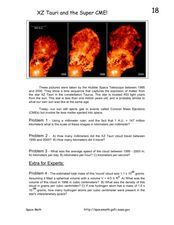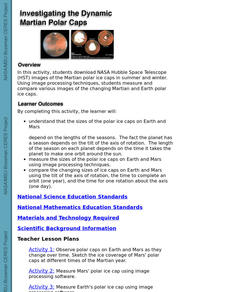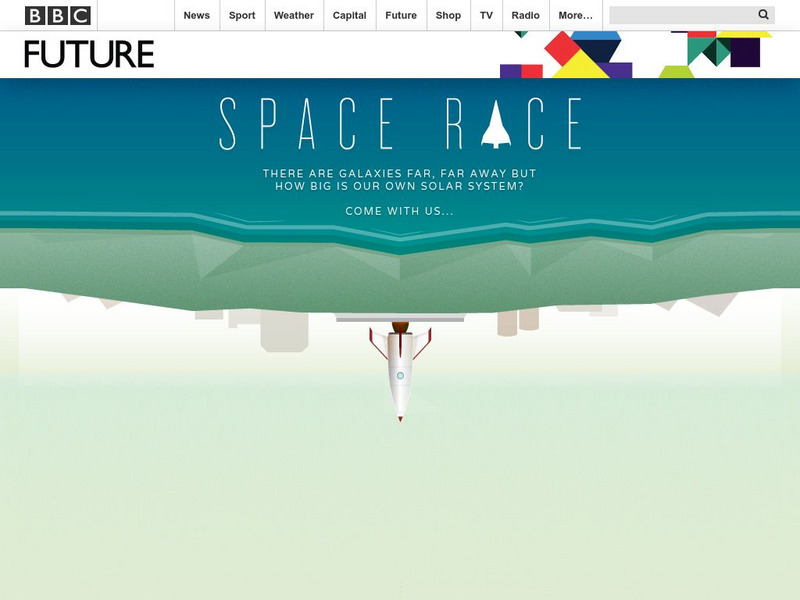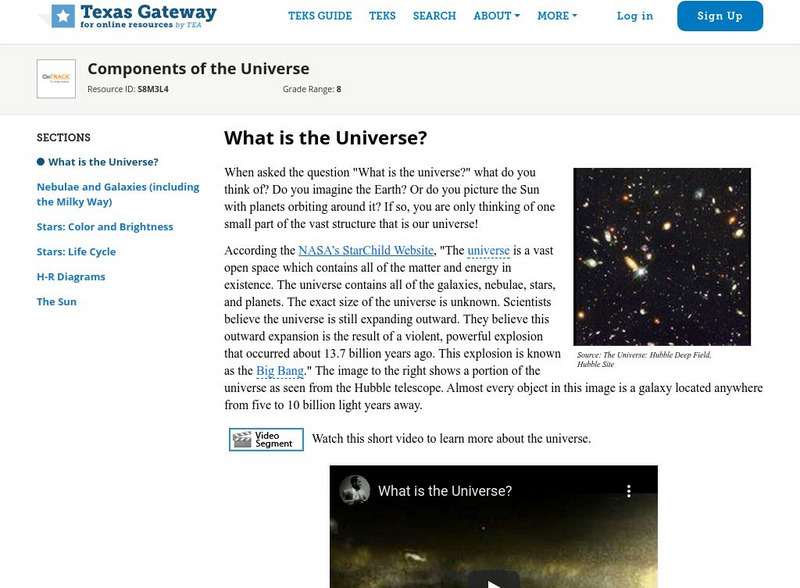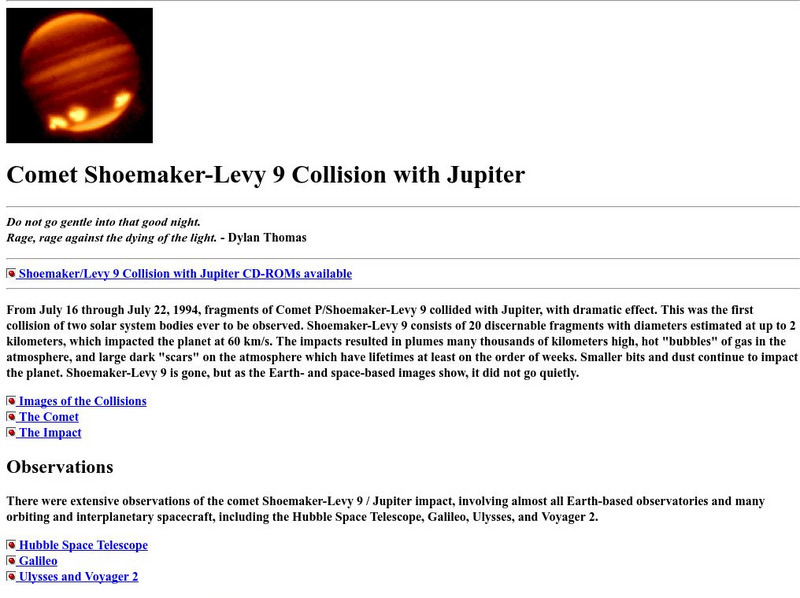Curated OER
Galaxies Galore!
Twelve of these slides display a picture of a galaxy and pose the question, "What kind of galaxy is this?" There are two slides about the Hubble Space Telescope's tuning fork, and another that asks viewers to analyze the number of...
Curated OER
Counting Craters on the Hubble Space Telescope!
In this Hubble Space Telescope worksheet, learners are given a photograph of the radiator recovered after being in space on the Hubble Space Telescope since 1993. Students solve 6 problems about the impacts that left craters on the...
Curated OER
A Galaxy Up Close
In this Sombrero Galaxy worksheet, students observe infrared images taken by the Spitzer Infrared Telescope and the Hubble Space Telescope. They answer 9 questions about the details of the images such as the radius of the stellar...
Curated OER
The Relative Sizes of The Sun and Stars
For this relative sizes of the sun and stars worksheet, students determine the relative sizes of the Earth, Jupiter, the Sun and other stars. Students compare the size of stars given ratios of one star to another.
Curated OER
Black Hole...Fade-out!
In this black hole worksheet, students read about how images fade to black when they reach an event horizon of a black hole. Students solve 3 problems about black holes using a given equation for luminosity. They find the time it takes...
Curated OER
Seeing a Dwarf Planet Clearly: Pluto
In this dwarf planet activity, students use images from the Hubble Space Telescope and they determine the scale of the image, they identify the largest features in the images, they calculate the volume of Pluto and they create a model of...
Curated OER
XZ Tauri and The Super CME!
In this XZ Tauri and coronal mass ejections worksheet, students use 3 photographs taken by the Hubble Space Telescope to solve 4 problems. They find the scale of the images, they determine the number of kilometers the XZ Tauri cloud...
Curated OER
Coronal Mass Ejection
In this coronal mass ejection learning exercise, students read about the coronal mass ejections detected by the IMAGE satellite and the Hubble Space Telescope resulting in auroras. Students solve 6 problems and determine the speed of the...
Curated OER
The Changing Atmosphere of Pluto
In this atmosphere of Pluto activity, students use an equation for the orbit of Pluto to determine the semi-major axis, the semi-minor axis, the ellipticity of the orbit, the aphelion and the perihelion. They also determine the predicted...
Curated OER
Counting Galaxies with the Hubble Space Telescope
In this counting galaxies worksheet, students use a photograph taken by the Hubble Space Telescope and they divide the field into 16 square areas. They find the average number of galaxies in the cells, they find the area of one of the...
Curated OER
Hubble Spies Colliding Asteroids!
In this colliding asteroids worksheet, students are given the equation to determine the collision time for asteroids. Students use this equation to solve 4 problems including finding the area of a cross-section through the body of an...
Curated OER
Galaxies Galore, Games and More
Students practice skills used in scientific investigation while studying the three main types of galaxies. Students identify Earth as part of Milky Way galaxy, the parts of galaxies, and the types of galaxies, as well as classify...
Curated OER
Hubble Space Telescope Webquest
Young scholars research the Hubble Space Telescope. In this Hubble Space Telescope instructional activity, students complete a webquest about the Hubble Space Telescope.
Curated OER
Satellite Drag and the Hubble Space Telescope
In this satellite drag and Hubble space telescope worksheet, students solve two problems using a graph showing the altitude of the satellite vs. the year with two lines showing two different types of re-boost and one line without...
Curated OER
Investigating the Dynamic Martian Polar Caps
Students download NASA Hubble Space Telescope images of the Martian polar ice caps in summer and winter, and measure and compare various images of the changing Martian and Earth polar ice caps.
Curated OER
Eye in the Sky
Students use the Internet to broaden their knowledge and understanding of the Hubble Space Telescope by participating in an Internet scavenger hunt, searching for information about the objectives, past successes and repair of the telescope.
NASA
Nasa Quest: Live From the Hubble Space Telescope
An interactive NASA site with detailed information about the Hubble Space Telescope. Includes a gallery of images, historical information, teacher's guides, and links to special online events.
BBC
Bbc: Space Race
There are galaxies far, far away, but just how big is our own solar system? Scroll through this interactive to quickly observe just how much we know and have learned about our solar system.
Other
University of Leicester: Comets
A detailed look at comets. Content outlines our observational history, as well as the origins of comets and an explanation of the appearance of comets.
Other
Cometography.com: C/1995 01 (Hale Bopp)
This site provides a detailed overview of the comet C/1995 01 (Hale-Bopp), the great comet of 1997. Content includes discovery, and observational and orbit information, as well as several images.
Texas Education Agency
Texas Gateway: What Is the Universe?
The following tutorial is an explanation of what the universe is composed of.
NASA
Nasa Space Science Data Archive:comet Collision With Jupiter
Comet collision with Jupiter with lots of pictures and some text. Links to the information about the comet, the impacts, and observations made by four different spacecraft.
Space Telescope Science Institute
Hubble Site: Newscenter
Read up to the minute as well as archived news reports about the Hubble space telescope at this site. Here you can view pictures taken by the telescope as well as learn about its help in the advancement of space exploration.
PBS
Pbs Nova: A Conversation With Neil De Grasse Tyson
Nova offers an enlightening conversation with astrophysicist Neil deGrasse Tyson. Topics include origins of the universe, multidisciplinary approaches to science, exciting recent discoveries, his position as director of the Hayden...








